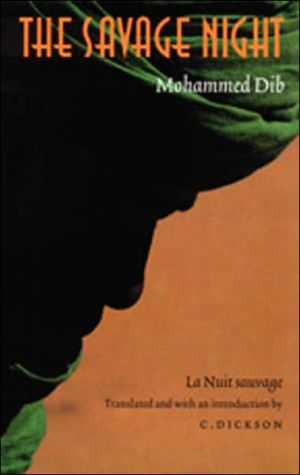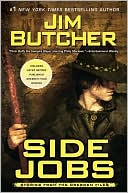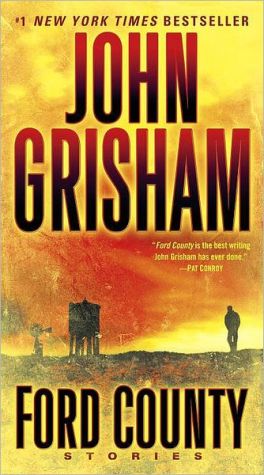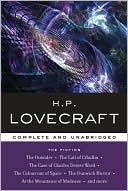The Savage Night
The Savage Night collects thirteen stories by Mohammed Dib, one of the founding fathers of North African literature. Whether set in present-day Algeria, depicting the war for independence, or evoking memories of the colonial era, many of the stories in The Savage Night paint a vivid picture of the diverse facets of the Algerian question. Dib's other settings include Latin America, war-torn Sarajevo, and Paris. A major element unifying his work is the unanswered question of human brutality. In...
Search in google:
The Savage Night collects thirteen stories by Mohammed Dib, one of the founding fathers of North African literature. Whether set in present-day Algeria, depicting the war for independence, or evoking memories of the colonial era, many of the stories in The Savage Night paint a vivid picture of the diverse facets of the Algerian question. Dib's other settings include Latin America, war-torn Sarajevo, and Paris. A major element unifying his work is the unanswered question of human brutality. In the face of our shameful indifference, Dib shows us that senseless violence is a daily reality for many. The Savage Night is the first book-length English translation of Dib's work.Kirkus Reviews“The Algerian war for independence from France, and the sufferings of oppressed peoples in such other theaters of conflict and cruelty as South America and Sarajevo, provide the themes for this exemplary collection (the first booklength English translation of Dib's work) of 13 stories by a prolific and prizewinning veteran (b. 1920) North African writer.The author's homeland is the scene of ''The Detour'' (reminiscent of Paul Bowles's icy cautionary tales), as well as, among others, of the superb title story and ''Talio is Dead'' (which depicts the agony of exile as movingly as anything in contemporary fiction). But ''The Merry Misfit'' (about a Parisian who impulsively bonds with his city's homeless populace) and ''Letter to Mother,'' which puts a grim postmodernist spin on the theme of Holocaust guilt, are equally compelling and rewarding. A fine introduction to an unjustly neglected contemporary master.”—Kirkus Reviews
\ Chapter One\ \ \ The Eye of the Hunter\ \ \ "You know them. You know what they're like," she says withoutlifting her head, without looking at me.\ A child grown up too soon? A woman.\ In a low, bitter voice, she goes on, "I'm not looking for trouble. Idon't want to stir up a lot of trouble for myself. Or worse, have mythroat slit or even ..."\ Those buttocks, those breasts under the thin cotton shift. Awoman. Keeping my eyes fixed on the terraces that rise up beyondthe ridgeline, I'm only half listening. First there is that shallow,bare dip that slopes up from here and flattens out into an equallybare platform, ending abruptly over there in that rocky outcrop.Then above, pointing in all directions, the roof beams of the white-washedmud terraces. The better part of the village tips down andout of sight on the other side of the slope. I'm just a stranger here.\ Her head bowed, she goes on in that same tone, that same voice,"... be left with my guts hanging out!"\ She repeats, "You know them. I don't want to stir up a lot oftrouble for myself," and her resentful, stubborn face turns a brick-red.It is nevertheless a nice face, with that blue tattoo mark on theforehead.\ I let out a string of insults.\ And her sole reaction is to raise her head. Lifting it up — thosepanther eyes of hers are devouring me, defying me too — she stepsbackward. I follow. Gradually, almost imperceptibly, she reaches adense clump ofcactuses. Monstrous yellow warts of already ripe,pulpy fruit riddle the stumps of green flesh. I pause, very briefly, toglance again toward the houses, or what can be seen of them — stillno one. And when I turn back to take another step, Lord Almighty,her smoldering eyes block the way.\ Perched high in the rocks, surrounded by cactuses and wild olivetrees, we stand staring at each other. Like an ardent sea of chalk,the flat plain glimmers far below.\ She starts in again: "They'll leave me with my throat cut."\ She sizes me up unblinkingly. My insults didn't phase her in theleast. Her blazing eyes are still throwing up the same wall, a wallthat prevents me from taking another step.\ Poised to scream, tempted to do so but checking herself, she saysagain, "With my throat cut or my guts hanging out, and if my assassinscan't finish the job alone, all the others will be there to helpthem! And who would be to blame? A vagabond, a pig who goesaround sticking his nose where it doesn't belong."\ "Good God, where is the man?" I ask.\ "There, behind the cactuses."\ No longer a child, and even less a woman, she motions briefly toone side with her chin.\ "He's sprawled back there like a slab of meat set out for curing,an old fleabag that wanders about from hut to hut begging. Andonce his belly's full, he goes back there, flops down, and spendshours sleeping it off. He saw everything."\ I don't know who I'm dealing with anymore. A child? A woman?\ "Are you sure?" I ask.\ A hoarse laugh cracks in her throat.\ "Of course I'm sure! I tell you, he knows everything. And nowhe's back there snoring on the other side of those cactuses. He'llprobably sleep till aaçer."\ "And you brought me here ..."\ "He comes every day, and who knows him? Not a soul. And hedoesn't know anyone either. He's like a lone dog. A stray animal,that's all he is."\ Her voice trails off until it finally fades in with the mutterings ofthe wind, telling its own tale with the very same intonations. I amengulfed in those fiery eyes that are staring relentlessly into mine. Abeauty that will cost me dearly — not a child, a woman.\ I repeat, "And you brought me here ..."\ Whether it is the wind or the voice, the plangent, sinister complaintspersist, ignoring my remark. "If anything happens to me, ifthe slightest thing ever happens to me —"\ Abruptly, I put a stop to it, saying, "What could happen? We'llfind out soon enough."\ She drops her crazed lament, but immediately affects a mockingtone of voice and asks, "When will we find out? When they comeafter me? We'll find out when it's already too late?"\ "We have the whole afternoon ahead of us. There's plenty oftime."\ A furtive look lights her face.\ "The afternoon. This afternoon?"\ And she decides she will venture the question, such a strangequestion: "Even so, do we really have all that much time?"\ With a laugh, trying to look on the bright side of things, I explain,"The shadow of that olive tree is making a perfect circlearound its base. It will take quite some time for it to grow long,stretch out away from the tree. When the shadow reaches the horizon,or gets close, the animal, if he is back there, had better wakeup. It'll be high time by then."\ With her mouth gaping open, she is gulping in the scorched air,shouting, "Oh yeah, sure! And in the meantime, we mustn't disturbhis lordship!"\ She stifles her cry, avidly swallowing in more air as though therewouldn't be enough. Her wide eyes dart frantically about again.\ After a quick glance in the direction of the village, she adds withan anxious yelp, "It'll be too late!"\ "Too late?"\ Standing there face to face, we can't take our eyes from one another.Sweat is making her hair stick to her temples, dampeningher underarms. Drowning in each other's gaze, neither of us uttersa word. The virulent, glaring heat, the shrill trilling cicadas, thevicious pulsing air, and ... nothing more. Nothing as far out into theland as one might search.\ Simply asking, what is it? ... what do you have in mind thatyou ...? is like lifting the weight of a mountain.\ Exhausted from the effort, I leave the question hanging.\ She too, though she doesn't seem to have waited for me to askbefore proffering a pat answer, barely has the strength to say, "Because ...\ As the space filled by the fire spirits grows, the silence deepens,becomes heavier, if that's possible.\ Breathing slowly, her parched lips slightly open, she is still castinga dark look at me. Is she aware of it? Does she even see me? I'mnot really sure. Then I understand — no, she and I both understand— that, in spite of the silence, there are still words being exchangedbetween us. The same secret words echoing deep in our flesh, deepdown in this dark well, the same fatal words that have already saideverything, already pronounced the sentence.\ Exasperated, I throw my knife at the trunk of the olive tree. Thepoint sinks into its bark. The blade vibrates, sending the sun reflectingriotously in all directions. And just as it had stuck fast inthe trunk, it now grows suddenly still.\ The girl turns her head, sees it, then gives me a knowing look."I'm not looking for trouble."\ Her tongue is thick. She moves it with great difficulty, beginstalking, like someone who isn't quite all there and doesn't reallyknow what she's saying. "I saw him coming. He was climbing thatslope back there, just like you always do, and I thought it was you atfirst. I was sitting down by these cactuses, and I was waiting for youto come over the top. But, God have mercy, instead I saw him clamberingup, leaning on his stick. He was even down on all fours, justlike this."\ She throws herself down on her hands and knees, scratching atthe earth with her fingernails. She's definitely a strange girl, there'sno question about that. My patience is beginning to wear thin.\ Now her voice is muffled, coldly flat: "You should've heard whathe said to me then. He knows everything."\ And, still in that crawling position, she begins moving forward,creeping up, coming so close that I can feel her long, slow breath onmy sandaled feet. Instinctively, I draw them away. Then I yank theknife out of the tree and she backs off.\ In fact, it only seems as if she has shrunk away. She hasn'tchanged places and, with her mouth almost in the dust, she growlsagain: "Listen, I don't want to stir up a lot of trouble for myself."\ I observe those handsome hips, the snakelike back. I didn't catchwhat she said after that. But her voice is still drifting up from thedust, and I hear, "What do you plan on doing with that knife ofyours? All you ever do is show it off or play with it. I've known youhad it for ages now. It's a lovely, long knife, but so what?"\ Is she expecting an answer? I don't have one to give her. There isno answer.\ She goes on talking into the dust and finally ends up wallowingaround in it, "You're always gazing at it as if you could see your ownlife and soul in that blade. Fondling it, admiring it as if it were infact your very soul."\ I laugh — I can't help it — and in laughing I think, "Somethingis going to happen, something inevitable, maybe even somethingirremediable."\ The trunk of an olive tree standing there, the trunk of a womanlying there. At least something that won't be in such a hurry tohappen as long as we wait here, a nightmare from which we wouldlike to convince ourselves it would be a shame if we didn't wake upin time. A nightmare that only muted, cautious sounds may enter.Sounds? At what point did the girl, stretched out full length at myfeet, start laughing too? Or what, sobbing? I try to recall. I don'tknow how long these hiccups, this insistent wailing, have been goingon, how long her body has been racked with tremors like this.\ With a quick flick of the knife, I slit the greenish surface of anarm of the cactus. A nauseating, colorless slime oozes from the tornwelt of spongy, white flesh.\ At the sight of it, I lose control and begin slashing deep gashes inother arms, then still others.\ The girl's spasms of hilarity — or despair? — suddenly vanish.Yet it doesn't keep her sides from twitching, her breath fromwheezing with a deathly rattle that it seems nothing can still. Justthen the heat clamps a leaden mask down on my face, a ringingsound fills my ears. The blinding light flooding down from the skyrips through me, right down to the very roots of the nerves.\ I lean back against an olive tree. Not the one which my newlythrown blade has just penetrated, where it is lodged. Not that one— the other one facing it, at the foot of which I contemplate, indazed horror, the confused tangle of cactus limbs armed with ivoryspines while watching the girl who has begun crawling forwardagain, rhythmically thrusting her pelvis and her hips into theground.\ She is writhing around dragging her body through the dust,gradually closing in on me. She's going to bump up against my legsagain. Going to? She's already got hold of one. Her arm is wrappingaround it, and something even thicker than the slimy juice of thecactuses is surging through my veins.\ When I try to pull my leg free, I realize I can't move at all. Herheaving, torrid breath is blowing on my feet, and there's nothing Ican do. It's impossible to break away, impossible to expel theground glass of sunlight from my eyes. I am still totally stunned. Istand there, rooted to the spot, simply stand there. Frantic, flamingwaves are washing over me. My head sways to and fro in the whirlingfury of fire.\ Her dry, cracked lips come gently to rest against my leg and thehorizon turns red. It's not that the sun is ready to go down, it issimply a warning.\ And someone pulls the knife out of the tree trunk it was stuckin. Not I — someone else, the unknown hunter. The one who'scome up without anyone really asking him to.\ The one who doesn't need any particular space to exist or movearound in — he fills all space. He goes through doors as easily as air.-Theone who crops up in as many different places as can be imaginedand in just as many different directions.\ At times we can catch a glimpse of him if we want to, springingup out of nowhere and then suddenly vanishing from sight, becominginvisible.\ Behind the thick growth of cactuses brandishing their needles,the vagabond lifts himself to a sitting position, looks around. Hisfist closes tightly over the stick by his side. Sleep's deep creases stillremain stamped into the bronzed chaos of his face. The two red andswollen rims of his slightly parted eyelids ooze with rheum.\ He pushes himself up from the ground using his free hand andhis stick. It's a difficult process for him to straighten up, get himselfinto a standing position. It leaves him breathless and panting.\ But as soon as he is on his feet, the vagabond moves off with ahasty, stooping gait. Without looking back.\ The vagabond flees, and the unknown hunter begins the chase.Foolishly believing he has a chance, the vagabond dodges, feints,and, wrapped in his rags, is like a cornered hyena — nothing but awild animal. An animal with no way out, an animal that can onlyturn and make its last stand, baring its teeth, gnashing out on allsides.\ And its blood came gushing out, and the avid flies, the sun, thedust drank it in. A bloated face that has already turned black likesome lightning-charred remnant.\ Now the sun will commence its descent. In this utterly desolateworld, the dying day has hollowed out an even greater emptiness.Will it be shortened, that path the hunter must take to regain thestillness, the weightless sleep of the stone shed just the time of onebrief passing? Shortened, the path along which he can escape thechanges that lead to decay? What is behind that rampart of cactuses?And beyond, out past those ragged peaks? That eternal placewhere evil revels in its own invention, waiting to emerge and shootout its rays like a second sun?\ It matters little to the dust, the rocks, or the wind whether theirthirst is quenched with a drop of river water or a drop of blood thatwill turn the earth red from one end of the valley to the other, theearth that at this very moment turns its hunched back to the unflaggingonslaught of winds. The earth, bathed in the silent delugeof molten lava from a punctured sun, takes on the opacity, the stiffnessof lead, and the sky too, turning a deep purple, has the colorand consistency of lead.\ Calmly, I watch, listen. The girl is gone. Will someone find aword one day, the right word to name this vast hemorrhage, andcurse the earth for its eagerness to accept as much blood as wemight offer it? What's become of that girl?\ One earth, one sun, one loneliness, and the long howling thatthe dogs have begun, lifting their heads toward the red sky wherebats, like dark thoughts, flit madly about, knocking franticallyagainst the walls of an invisible prison.\ \ \ Excerpted from THE SAVAGE NIGHT by Mohammed Dib. Copyright © 1995 by Editions Albin Michel.\ Translation copyright © 2001 the University of Nebraska Press.Excerpted by permission. All rights reserved. No part of this excerpt may be reproduced or reprinted without permission in writing from the publisher. \ \ \ \
Translator's IntroductionThe Eye of the Hunter1The Detour9The Little Girl in the Trees35The Savage Night47The Merry Misfit75Amria and the Frenchman91Talilo Is Dead105Paquita, or The Ravished Gaze113Life Today123Butterflies139Letter to Mother155Exodus165A Game of Dice173Afterword189
\ The Independent (London)"Mohammed Dib's ''Exodus'', from his rich, varied collection The Savage Night (Bison), narrates the departure of North Africans from a French village with an irony that should put Michel Whatzisname to shame."\ \ \ \ \ Kirkus Reviews“The Algerian war for independence from France, and the sufferings of oppressed peoples in such other theaters of conflict and cruelty as South America and Sarajevo, provide the themes for this exemplary collection (the first booklength English translation of Dib's work) of 13 stories by a prolific and prizewinning veteran (b. 1920) North African writer.The author's homeland is the scene of ''The Detour'' (reminiscent of Paul Bowles's icy cautionary tales), as well as, among others, of the superb title story and ''Talio is Dead'' (which depicts the agony of exile as movingly as anything in contemporary fiction). But ''The Merry Misfit'' (about a Parisian who impulsively bonds with his city's homeless populace) and ''Letter to Mother,'' which puts a grim postmodernist spin on the theme of Holocaust guilt, are equally compelling and rewarding. A fine introduction to an unjustly neglected contemporary master.”—Kirkus Reviews\ \ \ \ The Independent“Mohammed Dib's 'Exodus', from his rich, varied collection The Savage Night (Bison), narrates the departure of North Africans from a French village with an irony that should put Michel Whatzisname to shame.”—The Independent (London)\ \ \ \ \ Words without Borders blogwordswithoutborders.org/dispatches/article/the-savage-night-by-mohammed-dib/\ \ \ \ \ Kirkus ReviewsThe Algerian war for independence from France, and the sufferings of oppressed peoples in such other theaters of conflict and cruelty as South America and Sarajevo, provide the themes for this exemplary collection (the first booklength English translation of Dib's work) of 13 stories by a prolific and prizewinning veteran (b. 1920) North African writer. The author's homeland is the scene of "The Detour" (reminiscent of Paul Bowles's icy cautionary tales), as well as, among others, of the superb title story and "Talilo is Dead" (which depicts the agony of exile as movingly as anything in contemporary fiction). But "The Merry Misfit" (about a Parisian who impulsively bonds with his city's homeless populace) and "Letter to Mother," which puts a grim postmodernist spin on the theme of Holocaust guilt, are equally compelling and rewarding. A fine introduction to an unjustly neglected contemporary master.\ \








